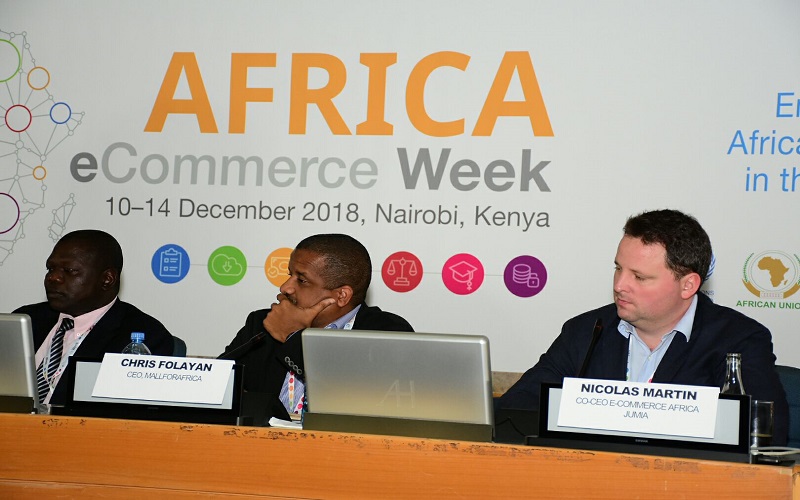Africa eCommerce Week: Africa had 21 million online shoppers in 2017

Africa had 21 million online shoppers in 2017 according to a report by UNCTAD, the United Nations body that oversees trade for development. The report notes that mobile connectivity is fueling e-commerce in countries like Madagascar, Uganda and Zambia, priming them to better engage with the digital economy.
The report was released at the ongoing Africa eCommerce Week in Nairobi, themed Empowering African Economies in the Digital Era. The event is co-organized by the African Union and European Union. More than 1,000 participants from 48 countries are gracing the event, including entrepreneurs, CEOs and civil society representatives. Nicolas Martin, co CEO Jumia E-commerce branch is also in attendance.
Three reports, which demonstrate readiness across seven policy areas in the UNCTAD-led e-Trade for all partnership, were launched at the opening of the event which is the first Africa eCommerce Week in Nairobi, Kenya.
‘’Recommendations in the reports lay the ground for e-commerce stakeholders to act’’ UNCTAD Secretary-General Mukhisa Kituyi said.
“The benefits of the report recommendations will not be felt unless they are effectively implemented. This will require integrating specific elements of the recommendations into national development plans, government and private sector initiatives, ICT policies and strategies, regulatory frameworks and development projects,” he added.
For instance, Uganda’s mobile transactions amounted to a staggering $16.3 billion, half the national GDP. But Zambia, where mobile money is gaining momentum, lags since Zambians prefer cash-on-delivery for e-commerce transactions. In Madagascar, only 6% of the population use the Internet and only 4% have bank accounts. But this means retailers are more likely to accept online payments via mobile phone.

All three countries face challenges in expanding information, communication and technology (ICT) infrastructure, improving trade logistics and access to financing for e-commerce ventures. The reports offer insight into the country-specific elements that could help unlock certain areas of the digital economy.
The Uganda assessment, for example, recommends the establishment of a multi-sectoral task force on e-commerce to help create a common understanding of the opportunities and challenges associated with it. Doing so would also improve public-private coordination, the report outlines.
In Zambia, the assessment proposes accelerating the existing national addressing and postcode project. Since 2014, more than 60,000 house number and street number signs have been installed. Weak physical addressing remains a barrier for local e-commerce vendors. This means goods ordered online cannot always be delivered efficiently and reliably.
The Madagascar assessment highlights the need for a more efficient financing system for ICT and e-commerce start-ups. It recommends strengthening the dialogue between the private sector, the government’s Economic Development Board of Madagascar, technology start-ups and banks, who can together define the most common needs in the field of the digital economy.
This would help stimulate investments in micro, small and medium-sized enterprises, which are the engine of the local economy.
The reports consider seven key areas: overall e-commerce readiness and strategy, ICT infrastructure and services, trade logistics and facilitation, payment solutions, legal and regulatory frameworks, e-commerce skills development, and access to finance.
The Africa eCommerce Week is a five-day event, which runs December 10-15. It is an off-shoot of the global eCommerce Week, hosted in Switzerland each year by the United Nations Conference on Trade and Development (UNCTAD).
Have anything to add to this story? Leave us a comment in the comments section below. In the meantime, follow or subscribe to our newsletter to ensure you don’t miss out on any future updates.


